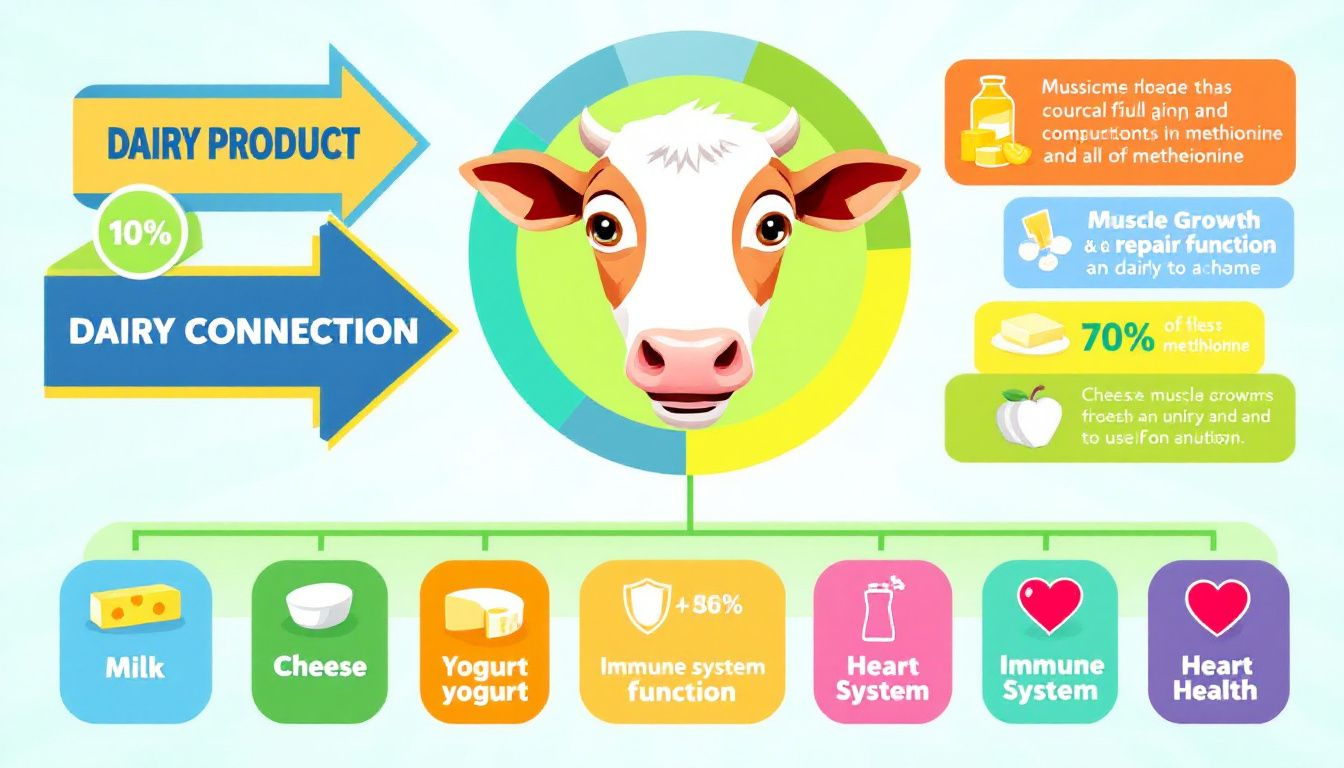Looking for foods rich in methionine? Methionine is an essential amino acid your body can’t make on its own. This article will list the top methionine foods and explain why they’re important for your health.
Key Takeaways
Methionine is an essential amino acid that must be included in the diet, as it supports protein synthesis, liver health, and acts as an antioxidant.
Top sources of methionine include animal products like eggs, meat, and fish, as well as plant-based options such as legumes, nuts, seeds, and soy products.
Adequate methionine intake must be balanced with B vitamins and antioxidants to prevent health issues, as excessive levels can lead to elevated homocysteine and related health risks.
Understanding Methionine

Methionine is an essential amino acid, a protein building block that our bodies cannot produce, so it must be included in our diet. This amino acid is crucial for producing proteins and other vital compounds needed for various bodily functions. Methionine acts as an antioxidant, protecting against damage from ionizing radiation and detoxifying harmful elements like heavy metals. It also plays a role in preventing fat accumulation in the liver, thus supporting liver health.
Deficiency in methionine can disrupt overall amino acid balance and metabolic function, underscoring its importance. Adequate intake of vitamins B6, B9 (folate), and B12 supports methionine metabolism and prevents the accumulation of harmful byproducts like homocysteine.
Knowing these fundamentals helps us explore the best sources of l methionine.
Top Animal-Based Sources of Methionine

Animal-based foods are among the richest providers of methionine, crucial for maintaining adequate levels of this amino acid in the body. Among these, eggs, various meats, and fish stand out as particularly potent sources.
Let’s explore how each of these contributes to our daily methionine intake.
Eggs
Eggs are an excellent source of methionine, significantly contributing to daily intake. They are highly nutritious, offering methionine and other vital nutrients that support overall health.
Meat
Various meats, both red and white, are substantial sources of methionine. Incorporating turkey, beef, and other meats can effectively meet your methionine requirements and support numerous bodily functions.
Fish
Fish like salmon and tuna are excellent methionine sources. A 6 oz fillet of tuna provides around 1505 mg of methionine, making it a powerhouse of this essential amino acid. Fish also offer beneficial omega-3 fatty acids, supporting heart health.
Adding fish to your diet is a flavorful and nutritious way to ensure adequate methionine intake. The added omega-3 benefits make fish an attractive option for boosting overall health.
Plant-Based Sources of Methionine

Plant-based diets offer numerous sources of methionine, such as legumes, nuts, seeds, and soy products.
These foods provide methionine and a variety of other nutrients that support a balanced diet.
Legumes
Common legumes like black beans and lentils are vital in a plant-based diet, offering substantial nutritional benefits. Lentils, in particular, are a good source of methionine, helping maintain a balanced diet.
Beans, peas, lentils, and peanuts provide diverse options for incorporating methionine into your diet. These foods are rich in methionine and provide fiber, protein, and other essential nutrients.
Nuts and Seeds
Brazil nuts are notable for their high methionine content, offering 315 mg in a 1-ounce serving. Nuts and seeds are excellent plant-based sources of methionine, making them valuable additions to any diet, especially for vegetarians and vegans.
Nuts and seeds, including sunflower seeds, also provide healthy fats, fiber, protein, vitamins, and minerals that contribute to overall health. Including a variety of these foods in your diet ensures adequate methionine intake and supports overall health.
Soy Products
Soy-based foods, like firm tofu and tempeh, are significant sources of methionine, essential for vegetarian and vegan diets.
Firm tofu and tempeh offer high methionine concentrations, making soy-based foods suitable for plant-based diets. These versatile foods can be incorporated into various dishes, ensuring a balanced intake of essential nutrients.
Dairy Products Rich in Methionine

Dairy products like milk, cheese, and yogurt provide essential amino acids, including methionine, necessary for various bodily functions. Milk with 2% fat contains 0.09 grams of methionine per 100 grams, and a cup of milk offers approximately 300 mg of methionine.
Cheese is particularly high in methionine, with Gruyere, Swiss, and Parmesan offering some of the highest levels. Cheddar cheese also provides a good amount, making it a viable option for boosting methionine intake.
Yogurt contributes to daily methionine intake and provides probiotics that benefit gut health.
Benefits of Adequate Methionine Intake

Adequate methionine consumption enhances liver performance, aiding detoxification and preventing fat accumulation. Methionine supports liver health by protecting against damage from substances like paracetamol.
This amino acid also improves the quality and elasticity of skin, hair, and nails through keratin synthesis. Additionally, it is essential for muscle repair and growth, aiding recovery after physical activity.
Methionine acts as a potent antioxidant, protecting cells from oxidative stress and damage caused by free radicals.
Potential Risks of Excess Methionine
While methionine is essential, excessive intake or supplementation can cause negative health effects like nausea and dizziness. High methionine levels are linked to elevated homocysteine, which is associated with an increased risk of cardiovascular disease.
Balancing methionine intake with other nutrients minimizes health risks associated with high methionine consumption.
Balancing Methionine with Other Nutrients
Balancing methionine with other nutrients is crucial for maintaining optimal health. Folate and B vitamins like B6 and B12 help metabolize methionine and prevent the buildup of harmful byproducts.
Antioxidants also help mitigate the potential negative effects of excessive methionine intake.
Importance of Folate and B Vitamins
Folate, vitamin B6, and vitamin B12 are crucial for proper methionine metabolism and help reduce homocysteine levels. These vitamins are essential for synthesizing methyl groups involved in DNA and amino acid metabolism.
Balancing methionine with folate, vitamin B6, and vitamin B12 prevents health issues and supports overall health.
Role of Antioxidants
Antioxidants mitigate the adverse effects of increased methionine intake, which can elevate oxidative stress in the body. They neutralize free radicals and reduce oxidative damage, protecting cells from the negative impacts of high methionine levels.
Key antioxidants like vitamin C, vitamin E, and selenium are especially valuable for those consuming higher methionine levels, as they bolster the body’s defense mechanisms. Incorporating a variety of antioxidant-rich foods can enhance overall health and complement a methionine-rich diet.
Methionine Supplements: Pros and Cons
High doses of methionine supplements can be dangerous, affecting metabolism and harming kidneys. Consult a healthcare provider before taking methionine supplements.
Excessive methionine can also increase elevated homocysteine levels, making professional guidance crucial.
Summary
Summarizing the key points, methionine is an essential amino acid crucial for various bodily functions. The blog post has covered top animal and plant-based sources, the benefits of adequate intake, potential risks of excess consumption, and the importance of balancing methionine with other nutrients. Understanding these aspects helps in making informed dietary choices that support overall health.
In conclusion, incorporating a variety of methionine-rich foods and balancing them with essential vitamins and antioxidants can lead to a healthier lifestyle. Make sure to consult with healthcare providers before making significant changes to your diet or starting new supplements.
Frequently Asked Questions
What are the best animal-based sources of methionine?
The best animal-based sources of methionine are eggs, turkey, beef, and fish, particularly salmon and tuna. Incorporating these foods into your diet can effectively boost your methionine intake.
Can I get enough methionine from a plant-based diet?
Yes, a plant-based diet can provide sufficient methionine by incorporating legumes, nuts, seeds, and soy products such as tofu and tempeh. Adopting these foods will ensure you meet your methionine needs.
What are the benefits of methionine for skin health?
Methionine supports skin health by enhancing the production of essential proteins and antioxidants, which improve skin quality and elasticity while promoting healthy hair and nails. Thus, incorporating methionine into your diet can significantly benefit your skin’s appearance and overall health.
What are the risks of consuming too much methionine?
Excessive consumption of methionine poses risks including nausea, dizziness, and elevated homocysteine levels, thereby increasing the potential for heart disease. It is crucial to monitor intake to safeguard your health.
Why is it important to balance methionine with other nutrients?
It is essential to balance methionine with other nutrients to prevent the accumulation of harmful byproducts and to promote overall health. This balance aids in optimizing bodily functions and minimizing potential health risks.

